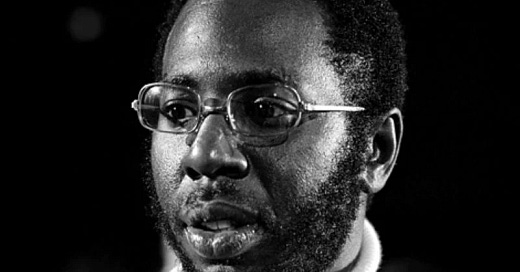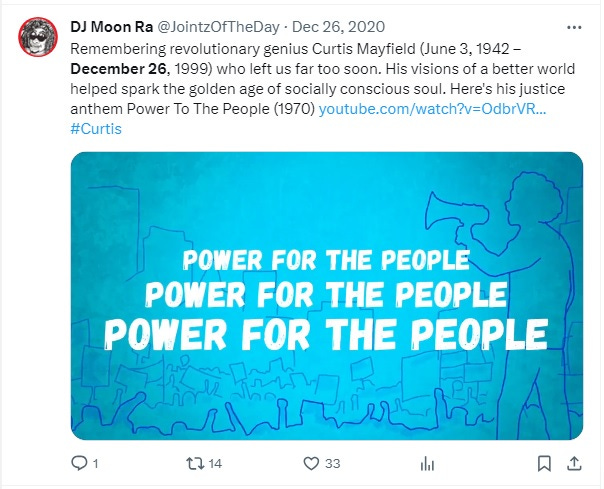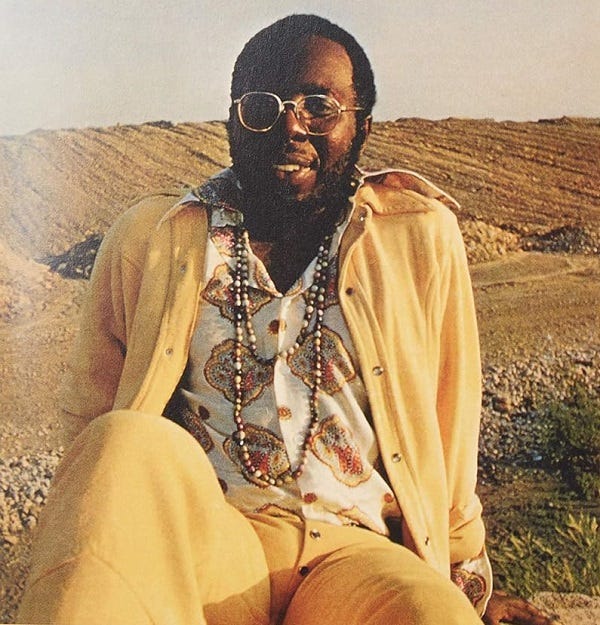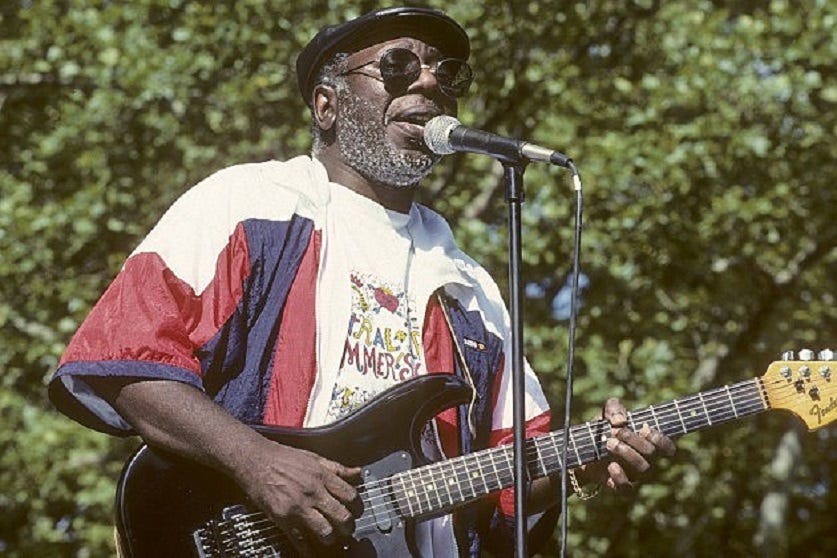Curtis Mayfield (June 3, 1942 – December 26, 1999) – Power to the People (1970)
This powerful freedom anthem was originally written as a demo for the musical prophet's debut solo album Curtis, but remained unreleased until 1974.
Watch full video on YouTube.
View most updated version of this post on Substack.
Open YouTube playlist of all songs in this post.
The revolutionary genius Curtis Mayfield left us on this date in 1999, gone far too soon at age 57.
See our earlier post on Mayfield for more on his career and musical history.
After spending twelve years with the Impressions, Mayfield officially left the group in mid-1970, although he continued to write and produce their material. The final album he recorded with them is one of the hardest to find today, Check Out Your Mind!, released in 1970. It was packed with superb cuts like the optimistic message song “Do You Wanna Win,” plus “(Baby) Turn On To Me,” “You’re Really Something Sadie,” “Madam Mary,” and its slamming title track.
Mayfield spent that spring and most of the summer producing his debut solo album Curtis, finally finishing it in August during a marathon 48-hour session. Its large cast of backing musicians included “Master” Henry Gibson on percussion and Phil Upchurch on bass.
Released in September, 1970 on his own label Curtom Records, its pair of singles became two of his most well-known songs. “(Don't Worry) If There's a Hell Below, We're All Going To Go” came out first, in November. When the engineer at the recording session initially heard its title, he spoke for many as he exclaimed, “That's a hell of a statement!”
An apocalyptic warning of what lay ahead for America if we didn’t improve race relations and learn to live together, it was a radical departure from the mostly upbeat, hopeful soul Mayfield had produced with the Impressions. But it resonated with audiences at a dark moment in the Nixon era when the war in Vietnam raged on; inner cities were reeling from the loss of manufacturing jobs, white flight, and skyrocketing heroin use; the FBI was attempting to wipe out the Black Panthers and other left wing groups through their illegal COINTELPRO campaign; and Malcolm, Martin, and the Kennedy brothers had all been assassinated.
“Hell Below” hit #3 R&B and #29 on the Billboard Hot 100. Propelled by the single’s sales and radio airplay, Curtis stayed on the charts for months, eventually peaking at #1 on the R&B charts and crossing over to #19 on the Billboard 200. Interviewed years later by his son Todd about the album’s reception, Mayfield recalled:
“It just wasn’t my plan. I thought I’d go home and be a businessman [after leaving the Impressions] . . . Of course, we were very serious towards the recording and the music and I hoped we’d maybe sell 25,000–50,000 albums, which, of course, would have been an asset to help the company [Curtom Records]. But I guess I just didn’t realize that we did have so many beautiful people out there.”
Its follow up single “Move On Up” was issued in April, 1971, an inspirational self-empowerment anthem solidly in the tradition of the Impressions’ sixties Civil Rights Movement songs “Keep On Pushing” and “We’re A Winner” (whose line “We’re movin’ on up!” inspired the later song’s title). Inexplicably, it failed to chart in the U.S., leading some to suspect the powers-that-be took steps to quash its promotion after the commercial success of “Hell Below” marked Mayfield as a revolutionary voice who needed to be suppressed.
In the UK, nothing held “Move On Up” back as it landed at #12 on the singles charts and went platinum. It became a staple of Mayfield’s live sets, and a cover version by the disco group Destination spent four weeks at #1 on dance charts during 1979, also hitting #68 R&B.
The album was full of other superb tracks. They included “Miss Black America,” which began with Mayfield asking one of his daughters what she wanted to be when she grew up, his horn and string-layered declaration of artistic and personal freedom “Wild and Free,” and the epic, beautiful jam “We The People Who Are Darker Than Blue” with a drum break and other distinctive elements destined to later be sampled by dozens of hip hop artists.
The recording sessions for Curtis also yielded several demos that didn’t make it onto the album, like “Readings in Astrology” and “Suffer,” which he co-wrote with Donny Hathaway and would later be re-recorded for his fifth solo studio album Sweet Exorcist (1974).
Another of the songs Mayfield produced demos for that year but did not include on Curtis could have been its political masterpiece, the freedom and justice anthem “Power to the People.” It was finally released in a polished version on Sweet Exorcist in May, 1974. His original demo was far more powerful. One wonders what might have been if “Power to the People” had made it onto Curtis and/or issued as a single in something close to its original form in 1970, when the record-buying public was hungry for revolutionary and anti-war message songs.
Mayfield’s life took a tragic turn due to a freak onstage accident at a concert at Wingate Field in Brooklyn on August 13, 1990. He was headlining a classic soul bill that also included the Delfonics and Harold Melvin and the Blue Notes, and a severe thunderstorm was brewing. Instead of stopping the concert due to the weather, event promoter and Brooklyn politician Marty Markowitz rushed Mayfield and his band onstage. Almost as soon as the music started, a hurricane-strength gust of wind toppled the front and back lighting trusses that had stood unsecured on the stage, and a falling stage light hit Mayfield on the back of his neck, shattering three vertebrae in his spine. He would be paralyzed from the neck down for the rest of his life.
In 1995, the award-winning British novelist Caryl Phillips produced the BBC documentary Darker Than Blue which provided an up close and personal look at Mayfield's life after his tragic accident. It was a heartbreaking look at how the prophet's voice had been nearly silenced. During its filming, Mayfield said he hadn't written any new songs since his paralysis, and explained that “I have ideas, but if you can't jot them down or write them right away or get them to music, sometimes they fade like dreams.”
A year after the documentary aired on the BBC, Mayfield released his final album New World Order in 1996. Recording his vocals was a feat of incredible endurance, as he had to be positioned lying flat on his back or at a slant on the studio floor in order to allow enough air to fill his lungs. Using this method, he was able to sing a couple of lines at a time.
The first song he wrote for the album was the inspirational “Back to Living Again,” featuring Aretha Franklin, which gospel singer Rosemary Woods helped him compose while sitting at his bedside with him. After that, the rest of the album's songs flowed out of Mayfield, finding their way into the world after years of being pent up inside him. Other highlights included a re-recorded version of his Curtis cut “We People Who are Darker than Blue,” featuring Roger Troutman, and arguably the album’s masterpiece, the epic meditation on drug addiction and life’s ups and downs “Here But I'm Gone.”
In February, 1998, Curtis’ right leg had to be amputated due to complications from type 2 diabetes. He died the following year on the day after Christmas, released from his earthly bonds to be wild and free again.
Rest in Power, Curtis Mayfield.
Further info:
Movin' On Up: The Music and Message of Curtis Mayfield and the Impressions (trailer / full program), documentary, 2008.
“Living: Curtis Mayfield and the Making of 'New World Order',” by Dean Van Nguyen, PopMatters, April 7, 2010.
“‘Traveling Soul: The Life of Curtis Mayfield,’ co-written by son Todd, delves into singer’s celebrated life and devastating, paralyzing accident,” excerpt from the book by Todd Mayfield and Travis Atria, Rolling Stone, October 3, 2016.
“[When] Curtis Mayfield quit the Impressions,” excerpt from Traveling Soul: The Life of Curtis Mayfield by Todd Mayfield and Travis Atria, WTTW News, 2017.
#soul #funk #Impressions #CurtisMayfield









